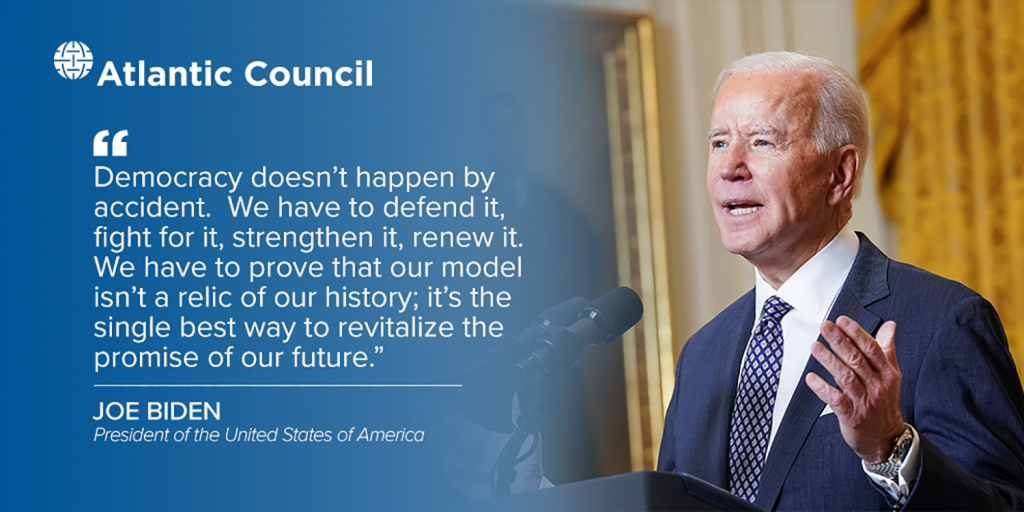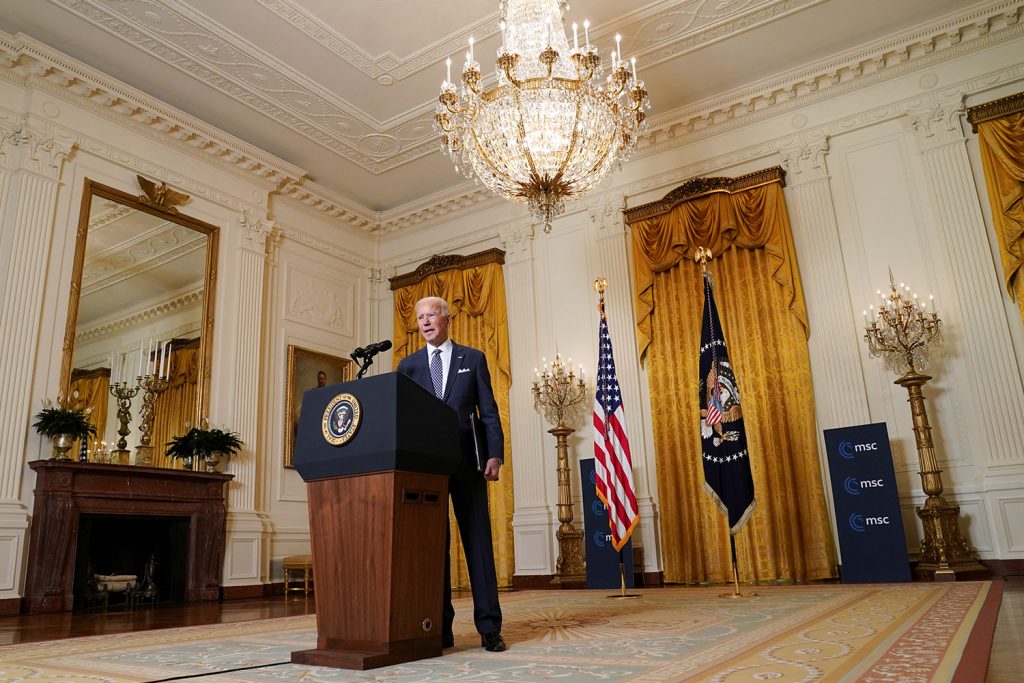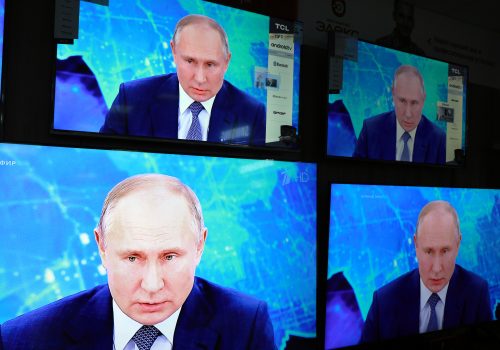It was by design that Joe Biden deployed the term “inflection point” three times in his most significant foreign policy speech thus far as president on Friday. He wanted to ensure the historic weight of his words was not missed.
Above all, he wanted his virtual audience at the Munich Security Conference to hear that global democracies faced a defining moment in their accelerating contest with authoritarianism and that they dare not underestimate the stakes. It is an argument I have made frequently in this column, itself called “Inflection Points” to reflect that conviction of a historic moment. Yet it had never been so clearly articulated by a US president.
“We are in the midst of a fundamental debate about the future and direction of our world,” Biden said to a receptive audience, though it was also an audience unsettled by the sudden, if welcome, shift from the cold shoulder of former President Donald Trump’s “America First” agenda to the global embrace led by his successor.
“We’re at an inflection point,” Biden said, “between those who argue that, given all the challenges we face—from the fourth industrial revolution to a global pandemic—that autocracy is the best way forward… and those who understand that democracy is essential—essential to meeting those challenges.”
Biden’s image, beamed to Munich from the White House, was symbolically framed on the large screens of the main stage beside German Chancellor Angela Merkel and French President Emmanuel Macron. After each of their fifteen-minute speeches, British Prime Minister Boris Johnson, who had just finished chairing a virtual meeting of G7 leaders, joined them for the kumbaya moment.
Wolfgang Ischinger, chairman of the Munich Security Conference, had every reason for satisfaction as he convened this reunion of the four allies who did so much to repair Europe after the devastation of World War II. Working with partners, those four countries took the lead in creating the rules-based institutions that have been at the center of global governance for the past seventy-five years.
Yet what lurked beneath this powerful moment was a growing recognition among senior Biden administration officials and their European counterparts of just how hard it will be to slow China’s authoritarian momentum, particularly as the country emerges as the first major economy to escape COVID-19, to restore growth, to engage in vaccine diplomacy, and to offer an enticement to its some 1.4 billion consumers.
Thus, the Biden administration will need to develop a far more creative, intensive, and collaborative give-and-take approach to its Asian and European allies than perhaps ever before. Galvanizing international common cause has seldom been this important, but it also perhaps has never been this difficult.
Get the Inflection Points newsletter
Subscribe to Frederick Kempe’s weekly Inflection Points column, which focuses on the global challenges facing the United States and how to best address them.
There are several reasons for that.
First, any US policy must factor in China’s role as the leading trading partner for most of America’s key partners, including the fact that China dethroned the United States in 2020 for the first time ever as the European Union’s leading trade partner in goods.
That will make most European countries, and in particular Germany, unwilling to consider any thoughts of decoupling from the Chinese economy or entering a new Cold War. The United States must be careful to consider the political and economic needs of its partners—and recognize they are unlikely to adopt a common, coordinated position on China without a cold-hearted calculation of their own national interests.
Biden usefully factored that into his speech. “We cannot and must not return to the reflexive opposition and rigid blocs of the Cold War,” he said. “Competition must not lock out cooperation on issues that affect us all. For example, we must cooperate if we’re going to defeat COVID-19 everywhere.”
Second, European doubts will persist for some time about the reliability of the American partnership, particularly given Trump’s continued popularity, the political attraction of his “America First” policies, and his enduring role in Republican politics following his Senate acquittal.
That may result in many European officials hedging their bets.
A new survey by the European Council on Foreign Relations showed that although 57 percent of respondents saw Biden’s victory as beneficial for the EU, some 60 percent believe China will become more powerful than the United States over the next decade and 32 percent feel the United States can no longer be trusted.
Third, the Biden administration and its European partners must work to solve or head off strains across unsolved issues so that they don’t sour the chance of a fresh start. These range from continued Trump administration tariffs and sanctions to Airbus-Boeing trade disputes and US-German fights over the completion of the North Stream II pipeline from Russia to Western Europe.
Work on completing the pipeline from Russia had stopped last year—though over ten billion dollars have been invested and the project is already 94 percent complete—due to US secondary sanctions.
In particular, the Biden administration must work proactively with EU leaders to prevent looming fights over how best to manage and regulate the influence of America’s technology giants, including questions on competition policy, data management, privacy, and digital taxation.
European Commission President Ursula von der Leyen told CNBC that Biden would be an “ally” in fighting disinformation online and stepping up the rules on how tech firms operate. However, growing EU talk about “digital sovereignty” underscores the potential for digital conflict across the Atlantic.
Finally, the Biden administration’s reluctance to engage in new trade negotiations—and a lack of sufficient Democratic or Republican support for such deals—will leave the United States competing with Beijing with a hand tied behind its back.
In the meantime, China has been reaching out to Asian partners through the fifteen-country Regional Comprehensive Economic Partnership and a new EU-China Comprehensive Agreement on Investment.
The thing about historic inflection points is they can turn in positive or negative directions with generational consequences. Biden has usefully alerted us to our defining moment. So, there can be no excuse now if the United States and its global partners fail to engage in the hard work required to rise to this epochal challenge.
This article originally appeared on CNBC.com
Frederick Kempe is president and chief executive officer of the Atlantic Council. You can follow him on Twitter @FredKempe.

THE WEEK’S TOP READS
This week’s top reads begin with the full text of Biden’s Munich speech.
They continue with a look at China’s digital currency ambitions from the Financial Times, and Atlantic Council authors call upon US Secretary of the Treasury Janet Yellen to answer the challenge.
Next is a look at the Taliban’s campaign of target assassinations, prompting former US Secretary of State Madeleine Albright and former European Commission Vice President Federica Mogherini to outline a trilateral US-European-Afghan approach to avoiding Afghan state collapse.
Don’t miss Nick Burns’s brilliant reflection on former US Secretary of State George Schultz, who died at age one hundred, and why he compared diplomacy with gardening.
This week’s top reads begin with the full text of Biden’s Munich speech.
They continue with a look at China’s digital currency ambitions from the Financial Times, and Atlantic Council authors call upon US Secretary of the Treasury Janet Yellen to answer the challenge.
Next is a look at the Taliban’s campaign of target assassinations, prompting former US Secretary of State Madeleine Albright and former European Commission Vice President Federica Mogherini to outline a trilateral US-European-Afghan approach to avoiding Afghan state collapse.
Don’t miss Nick Burns’s brilliant reflection on former US Secretary of State George Schultz, who died at age one hundred, and why he compared diplomacy with gardening.
Finally, this week’s must-read takes a look at why the number of nuclear weapons states could double by 2030—and include US allies.
#1. BIDEN’S “INFLECTION POINT”
Remarks by President Biden at the 2021 Virtual Munich Security Conference
Joe Biden / THE WHITE HOUSE
Biden’s most significant speech on international affairs thus far as president is worth reading in its entirety for its sharp diagnosis of the global situation that he has inherited—and the clarity of the cure from an American perspective.
“We’re at an inflection point,” he said. “New crises demand our attention. And we cannot focus only on the competition among countries that threaten to divide the world, or only on global challenges that threaten to sink us all together if we fail to cooperate. We must do both, working in lockstep with our allies and partners.”
In one paragraph, he laid out what that means for the United States: “building back better our economic foundations; reclaiming our place in international institutions; lifting up our values at home, and speaking out to defend them around the world; modernizing our military capabilities while leading with diplomacy; revitalizing America’s network of alliances and partnerships that have made the world safer for all people.” Read More →
#2. CHINA’S DIGITAL AMBITIONS
Virtual control: the agenda behind China’s new digital currency
James Kynge and Sun Yu / FINANCIAL TIMES
How Janet Yellen can help deliver the digital dollar
Josh Lipsky and JP Schnapper-Casteras / ATLANTIC COUNCIL
To mark Chinese New Year, authorities across several cities have handed out tens of millions of “digital renminbi” in “red packets” across numerous cities that can be downloaded on smartphones and spent. Beijing and Suzhou alone doled out 200,000 packets in a public lottery—each worth about thirty US dollars.
James Kynge and Sun Yu in the FT explore the significance of this apparent show of government generosity, part of a larger Chinese effort to lead the world in the adoption of digital currencies, thus setting the global standard. Oh yes, a Chinese digital currency that its central bank monitors in real-time makes it easier to surveil its population. Read More →
Separately, the Atlantic Council’s Josh Lipsky and JP Schnapper-Casteras—after an Atlantic Council meeting this week with representatives of several central banks—urge Janet Yellen not to be left behind. They argue that unleashing a digital dollar could deliver stimulus more effectively, directly to every American citizen’s phone, while failing to do so soon could relinquish the country’s leading role in developing standards. Read More →
#3. THE TALIBAN’S KILLING CAMPAIGN
It’s time for the US to make good with Afghanistan
Madeleine K. Albright and Rector Federica Mogherini / CNN
Everyone is tired of the war in Afghanistan.
That’s all the more reason to read this CNN piece about the murderous logic behind the Taliban’s recent rash of orchestrated assassinations and what the United States and its European and Afghan partners must do to avoid Afghan state collapse.
Madeleine Albright and Federica Mogherini, a former US Secretary of State (and Atlantic Council International Advisory board member) and former Vice President of the European Commission respectively, lay out their ideas as the Biden administration takes a new look at a peace process gone wrong due to a “repeated failure to hold the Taliban accountable…”
The two women serve as co-chairs of the Atlantic Council Trilateral Dialogues on Afghanistan, which looks to develop a transatlantic framework for peace and security in the country. “Without a concerted, coordinated effort by the US and other key actors,” they write, “Afghanistan risks falling into chaos, further destabilizing a volatile region, advantaging terrorist groups, and, once again, precipitating a large-scale refugee crisis.” Read More →
#4. GEORGE SCHULTZ, GARDENER, R.I.P.
The Diplomat as Gardener
Nicholas Burns / FOREIGN AFFAIRS
As a young diplomatic correspondent at the Wall Street Journal, I had the good fortune of being on George Schultz’s 1988 trip to China that Nicholas Burns recounts in his masterful reflection on the former US Secretary of State in Foreign Affairs.
I remember Schultz telling the press corps on his plane about his preference to think about diplomacy as “tending the diplomatic garden.” At the time, this seemed to me to be in contrast to the geopolitical architectural work of his predecessor in the job, Henry Kissinger.
Burns, who is also an Atlantic Council board director, captures the power of Shultz’s gardening metaphor, “…grounded in a simple core belief: even a superpower had to show up in distant capitals, demonstrate interest and respect, get to know the leaders, and build familiarity and trust, so that when the crises came—as they surely would—it would have a network of friends and allies to turn to for help.”
The Biden administration can best demonstrate respect for Shultz, who passed away in California earlier this month at age one-hundred, with a return to his weeding, watering, and nurturing of international trust. Read More →
#5. THE NEW NUCLEAR QUESTION
When Allies Go Nuclear
Chuck Hagel, Malcolm Rifkind, Kevin Rudd, and Ivo Daadler / FOREIGN AFFAIRS
Chuck Hagel, Malcolm Rifkind, Kevin Rudd, and Ivo Daalder argue in Foreign Affairs that fraying American alliances and a rapidly changing security environment have shaken America’s nuclear security guarantees and threatened the fifty-year-old nuclear nonproliferation regime.
Drawing from their ground-breaking task force report for the Chicago Council on Global Affairs, they lay out a fictitious scenario from 2030 where an unforeseen, underground atomic explosion signals the expansion of the nuclear weapons club to twenty countries—more than double the number now.
“To the surprise of many,” write the authors, “the proliferation has come not from rogue states bent on committing nuclear blackmail but from a group of countries usually seen as cautious and rule abiding: U.S. allies.”
Read the article, or better yet the full report, and see if you agree with the authors that such an outcome isn’t as far-fetched as it might seem. (Two of the authors, former US Secretary of Defense Chuck Hagel and former Australian Prime Minister Kevin Rudd, are Atlantic Council International Advisory Board members.) Read More →
QUOTE OF THE WEEK

Atlantic Council top reads
Image: US President Joe Biden departs after participating in a Munich Security Conference virtual event from the East Room at the White House in Washington, U.S., February 19, 2021. REUTERS/Kevin Lamarque



